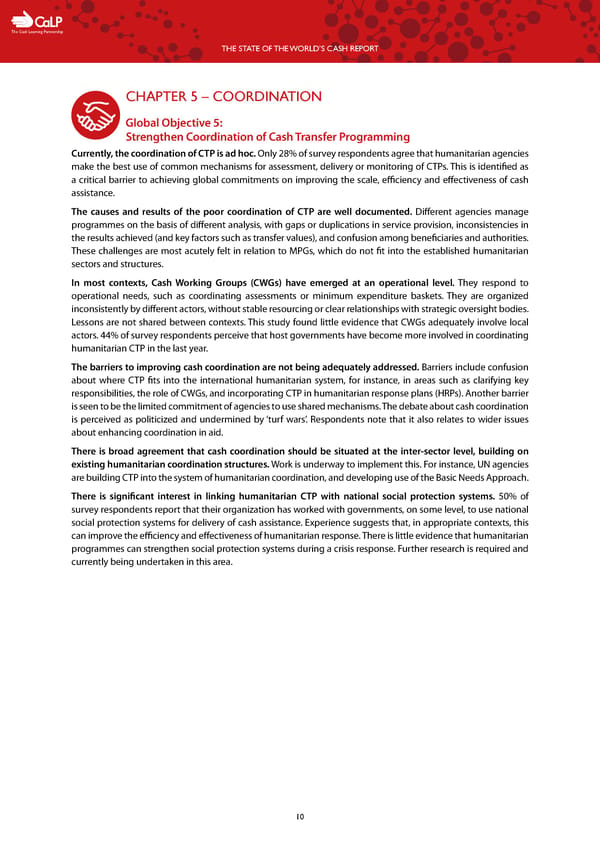C The Cash Learning Partnership THE STATE OF THE WORLD’S CASH REPORT CHAPTER 5 – COORDINATION Global Objective 5: Strengthen Coordination of Cash Transfer Programming Currently, the coordination of CTP is ad hoc. Only 28% of survey respondents agree that humanitarian agencies make the best use of common mechanisms for assessment, delivery or monitoring of CTPs. This is identified as a critical barrier to achieving global commitments on improving the scale, efficiency and effectiveness of cash assistance. The causes and results of the poor coordination of CTP are well documented. Different agencies manage programmes on the basis of different analysis, with gaps or duplications in service provision, inconsistencies in the results achieved (and key factors such as transfer values), and confusion among beneficiaries and authorities. These challenges are most acutely felt in relation to MPGs, which do not fit into the established humanitarian sectors and structures. In most contexts, Cash Working Groups (CWGs) have emerged at an operational level. They respond to operational needs, such as coordinating assessments or minimum expenditure baskets. They are organized inconsistently by different actors, without stable resourcing or clear relationships with strategic oversight bodies. Lessons are not shared between contexts. This study found little evidence that CWGs adequately involve local actors. 44% of survey respondents perceive that host governments have become more involved in coordinating humanitarian CTP in the last year. The barriers to improving cash coordination are not being adequately addressed. Barriers include confusion about where CTP fits into the international humanitarian system, for instance, in areas such as clarifying key responsibilities, the role of CWGs, and incorporating CTP in humanitarian response plans (HRPs). Another barrier is seen to be the limited commitment of agencies to use shared mechanisms. The debate about cash coordination is perceived as politicized and undermined by ‘turf wars’. Respondents note that it also relates to wider issues about enhancing coordination in aid. There is broad agreement that cash coordination should be situated at the inter-sector level, building on existing humanitarian coordination structures. Work is underway to implement this. For instance, UN agencies are building CTP into the system of humanitarian coordination, and developing use of the Basic Needs Approach. There is significant interest in linking humanitarian CTP with national social protection systems. 50% of survey respondents report that their organization has worked with governments, on some level, to use national social protection systems for delivery of cash assistance. Experience suggests that, in appropriate contexts, this can improve the efficiency and effectiveness of humanitarian response. There is little evidence that humanitarian programmes can strengthen social protection systems during a crisis response. Further research is required and currently being undertaken in this area. 10
 The State of the World's Cash | Full Report Page 11 Page 13
The State of the World's Cash | Full Report Page 11 Page 13